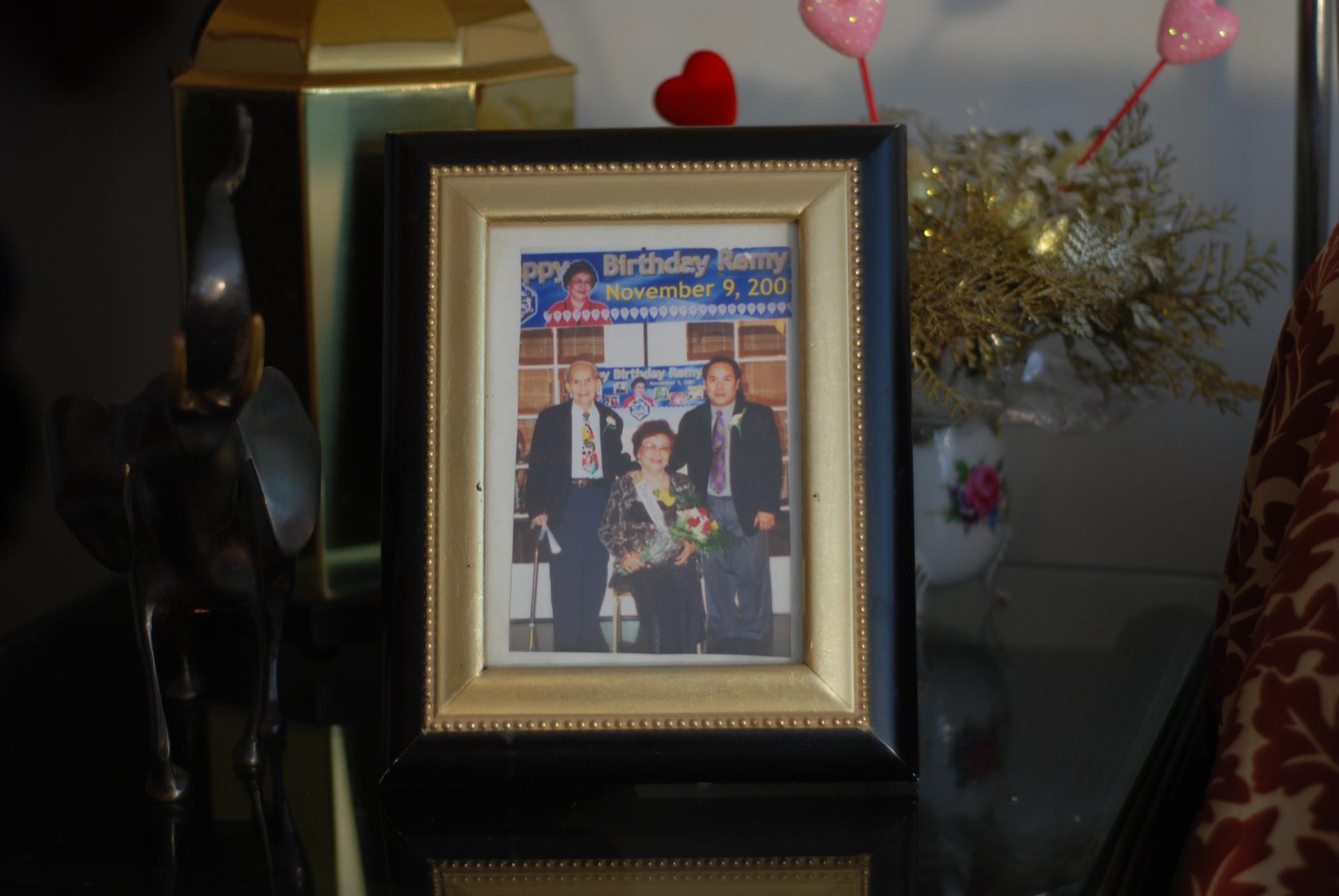Filipino WWII Veterans’ Families Hope Immigration Reform Does Not Leave Them Out
Remedios Cabagnots home is filled with family mementos. She has seen her three children who live in the Philippines just a handful of times since she came to the U.S. in 1993. (Credit: Odette Yousef)
With Congress poised to tackle comprehensive immigration reform, some are worried about what will be left out. In particular, there's concern that a policy overhaul might eliminate some categories of family visas. That's troubling to one group of immigrants who already wait the longest for those types of visas, and who feel they should be given special consideration. They are the families of Filipino veterans who fought for the US during World War II. WBEZ's Odette Yousef reports.
Their story really begins in the early 1940s. After bombing Pearl Harbor, the Japanese invaded the Philippines, which, at that time, belonged to the US.
"We really fought for them," said 86-year-old Remedios Cabagnot, sitting in her high-rise condominium in Chicago's North Side. "I can still remember the war. I was a teenager then." During the war, Cabagnot's husband, Serviliano Jambo Cabagnot, was one of hundreds of thousands of Filipinos who fought alongside the US.
The couple came to the US in the early 1990s, when Congress allowed Filipino vets to become naturalized citizens. Cabagnot said they wanted to live in the country she still calls "the land of honey." One of their sons, Al, was already here, and Remedios Cabagnot felt it wouldn't be long until her other two sons and daughter joined them. "We petitioned them right away," Cabagnot said. That was in 1993.
Al Cabagnot said they weighed things carefully when they filed the petition. In particular, they deliberately had his father, the WWII veteran, sponsor the petitions. "We thought being a US vet, it would be faster, it would facilitate the processing," he explained. "And we were so happy because they got approved right away. But we didn't know had to wait 20, 17 years for the visa availability."
In fact, Remedios and Al Cabagnot are still waiting. The petitions for the rest of their family are stuck in a backlog of visa applications—a backlog experienced most severely by Mexicans, Chinese, Indians and Filipinos. Filipinos can wait the longest for certain types of family reunifications because they're the second-largest immigrant group in the US, next to Mexicans.
"Filipinos have this waiting time, [a] substantial number of years compared to others," said Jerry Clarito, executive director of Chicago's Alliance of Filipinos for Immigrant Rights and Empowerment. Clarito said that Filipinos apply for a disproportionate number of family visas, but each year, the US how many visas may go to adult or married children and siblings per country. This has created long lines in countries that are heavily represented in the mix of US immigrants. In March, the US finally started processing Filipino reunification visa petitions that were filed in July, 1989. Clarito said this long waiting period is especially hard on aging Filipino veterans.
"They were in the front line of the battle," said Clarito. "Now they are behind, waiting." Clarito said Filipino veterans have gone through the trauma of war, and then endured the difficulties of acclimating to a new country. "If we recognize the services of the military people, we do recognize that the family support is number one to make the veteran or military person sane," he said.
Clarito's group is lobbying Congress to remember this as it starts reevaluating US immigration policies. He said he would like to see a stand-alone bill to address the long waits that children of Filipino veterans experience, so that it doesn't get lost in a larger bill for comprehensive immigration reform. Lawmakers from Hawaii recently introduced the Filipino Veterans Family Reunification Act, which would exempt children of Filipino veterans from the visa line if passed.
As for Remedios Cabagnot, she's seen her children a few times these last 23 years. They visited twice on tourist visas, and she last went to the Philippines 15 years ago. But Cabagnot is now too old to travel.
Her family's bid for reunification got more complicated two years ago, when her husband died, and she received a letter in the mail, saying that because of his death, the petitions were revoked. "We were all devastated when they told us that our prayers and petitions died with my husband," Cabagnot remembered.
Still, Cabagnot and her son Al hope Congress will remember them as it tackles immigration. In the meantime, they email their family in the Philippines, always updating them on the status of the petitions.
We want to hear your feedback so we can keep improving our website, theworld.org. Please fill out this quick survey and let us know your thoughts (your answers will be anonymous). Thanks for your time!
